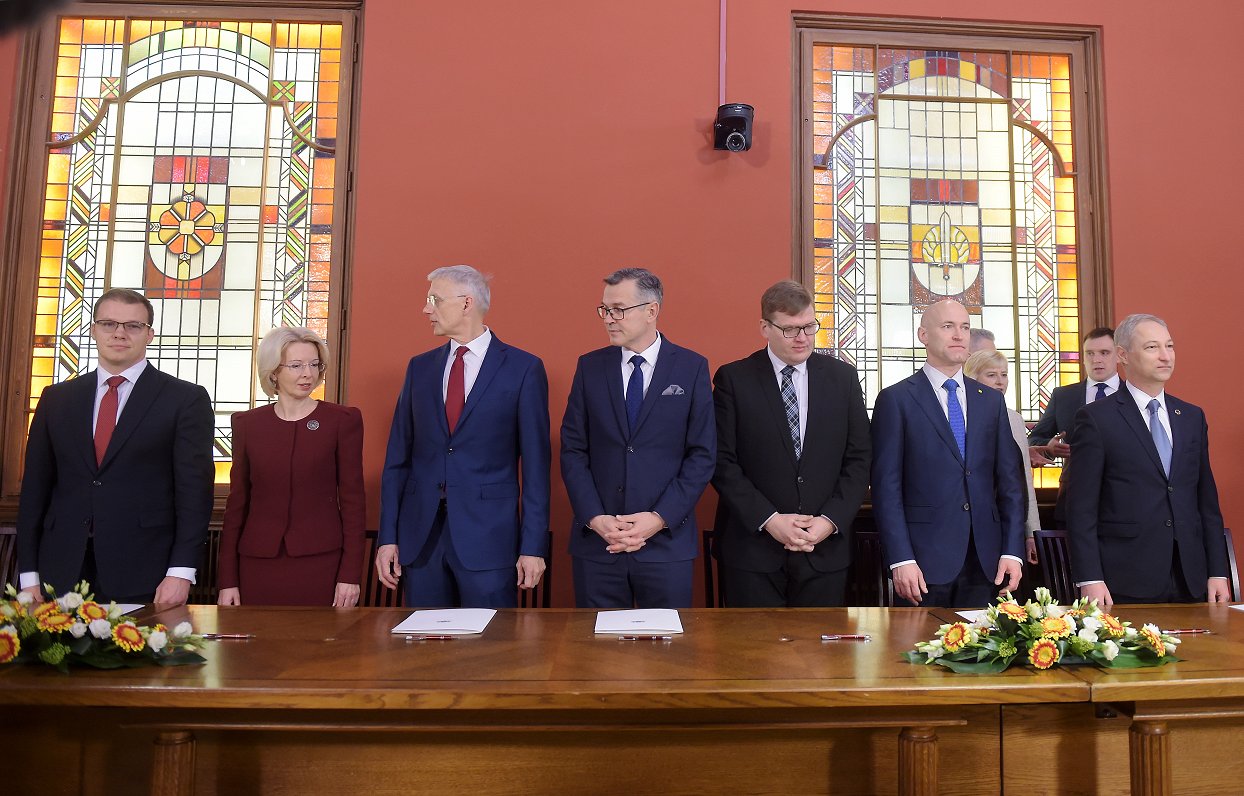The five-party coalition will be headed by Latvian-American dual citizen Krišjānis Kariņš, until recently a Member of the European Parliament (MEP), and will consist of his own New Unity party plus the New Conservatives, the Development/For! alliance, the National Alliance plus most of the KPV LV party. Though the parties in some cases make uneasy bedfellows, broadly speaking the coalition might be characterized as center-right in character.
61 Saeima deputies voted in favor of the government and 39 voted against.
109 dienas pēc vēlēšanām @Jekaba11 ar 61 balsi apstiprina @krisjaniskarins valdību https://t.co/6PweF2MeNV pic.twitter.com/wDfZDfj4bN
— LSM ziņu portāls (@lsmlv) January 23, 2019
Speaking to Saeima ahead of the vote, Kariņš said his number one priority would be to complete the clean-up of Latvia's financial sector as failure to do so would be "a threat to the whole of society." He also noted Russian aggression in Eastern Ukraine and elsewhere as an external threat and promised Latvia would "continue its Euro-Atlantic course" under his watch.
"That will not change," he said.
In response, Harmony's Vjačeslavs Dombrovskis said the government would "split society" and listed pre-election promises from all of the parties involved in the coalition that are notable by their absence in the government's proposed legislative program.
Dombrovskis also pointed out the fact that Kariņš himself had not stood in the Saeima elections and that he represented the smallest party in Saeima.
The 40th Cabinet of Ministers of the Republic of Latvia has been approved. Wishing success for the new Prime Minister @KrisjanisKarins and government! pic.twitter.com/cT5nDzEAvz
— Valdības māja (@Brivibas36) January 23, 2019
After months of sometimes fraught negotiations that saw two previous prime ministerial nominees fail to deliver workable government models (Jānis Bordāns of the New Conservatives and then Aldis Gobzems of KPV LV), Latvia will find itself in an unusual situation with a prime minister from the smallest party represented in Saeima. Kariņš' New Unity party holds just 8 Saeima mandates. Meanwhile the largest party in Saeima, Harmony, was not even included in coalition formation talks after all other parties refused to countenance it.
In the morning the coalition partners signed an agreement distributing ministerial portfolios as follows:
Prime Minister – Arturs Krišjānis Kariņš (New Unity)
Defense Minister/deputy PM – Artis Pabriks (Development/For!)
Justice Minister/deputy PM – Jānis Bordāns (New Conservatives)
Foreign Minister – Edgars Rinkēvičs (New Unity)
Economics Minister – Ralfs Nemiro (KPV LV)
Finance Minister – Jānis Reirs (New Unity)
Interior Minister – Sandis Ģirģens (KPV LV)
Education and Science Minister – Ilga Šuplinska (New Conservatives)
Culture Minister – Dace Melbārde (National Alliance)
Welfare Minister – Ramona Petraviča (KPV LV)
Environment and Regional Development Minister – Juris Pūce (Development/For!)
Transport Minister – Tālis Linkaits (New Conservatives)
Health Minister – Ilze Viņķele (Development/For!)
Agriculture Minister – Kaspars Gerhards (National Alliance)
Kariņš - full name Arturs Krišjānis Kariņš - was born in Wilmington, Delaware, USA on December 13, 1964, and attended the University of Pennsylvania, from which he graduated in 1996 with a Ph.D. in linguistics.
In Latvia he was one of the founders of the Jaunais Laiks (New Era) party in 2002 which has since undergone numerous metamorphoses into today's New Unity party. He served as Economics Minister from December 2004 until April 2006 and in 2009 became an MEP for the first time.
As soon as the vote was announced, congratulations began to pour in from politicians and others.
Congratulations, @krisjaniskarins. This year we mark 15 years since #Latvia joined our European family, reconciling geography and history, and five years since it joined the €-area. I count on you to continue Latvia’s active contribution to the European project. ???? pic.twitter.com/vfth6hgAeC
— Jean-Claude Juncker (@JunckerEU) January 23, 2019





























